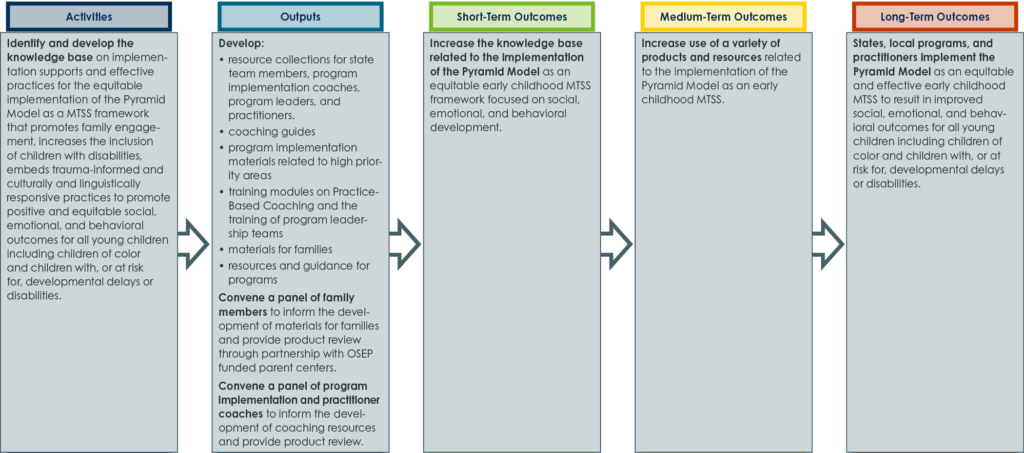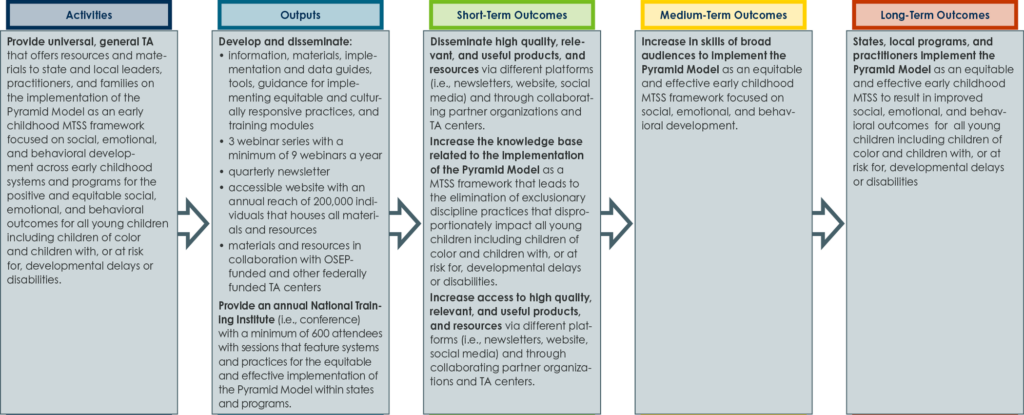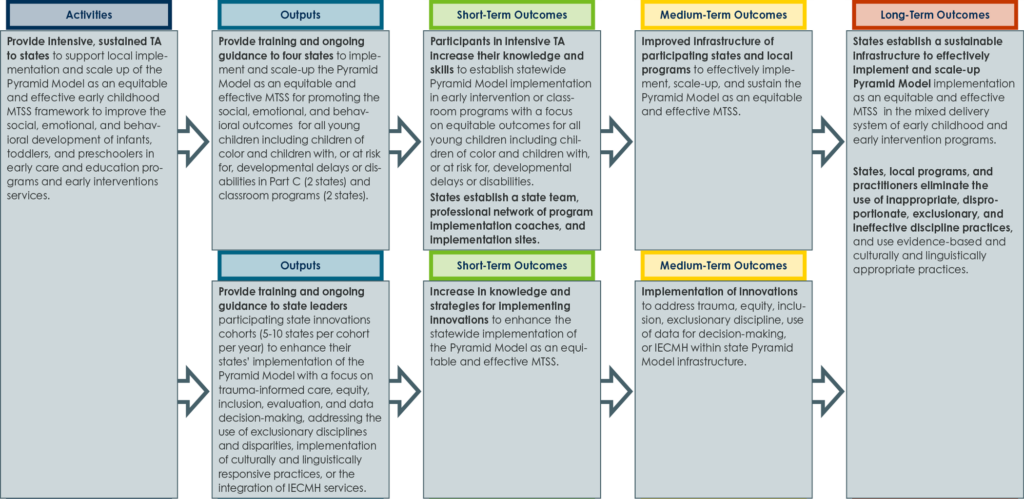The National Center for Pyramid Model Innovations (NCPMI) promotes policies and practices that advance equity, diversity, and the full inclusion and participation of all young children including children of color and children with, or at risk for, developmental delays or disabilities and their families in early care and education environments. The Pyramid Model practices and implementation approach affirm and celebrate the unique identities of young children and their families across all social identities. (See the full equity statement.)
Graphic View of Logic Model






Text-Only View of Logic Model
Inputs
The following inputs contribute to all activities that follow.
- Developers of an MTSS approach for social, emotional, and behavioral outcomes (i.e., Pyramid Model) including guidance for ensuring equity in access and outcomes.
- Providers of TA and training in the Pyramid Model for 20 years
- Extensive resources on the NCPMI website (state and program, data decision-making, coaching, equity, family engagement, IECMH, inclusion)
- Established partnerships with national early childhood associations, TA Centers, and dissemination partner (Pyramid Model Consortium)
- Equity Partner – Institute for Racial Equity and Excellence
- Successful use of implementation science to establish statewide implementation initiatives in 32 states
- Established state implementation networks and relationships
- Highly skilled Center staff and partners with expertise in key content areas.
- Institutional resources and support of the University of South Florida, University of Denver, Vanderbilt University, and Georgetown University
Activities
Each activity in this section aligns with an output in the following section.
- Activity 1. Identify and develop the knowledge base on implementation supports and effective practices for the equitable implementation of the Pyramid Model as a MTSS framework that promotes family engagement, increases the inclusion of children with disabilities, embeds trauma-informed and culturally and linguistically responsive practices to promote positive and equitable social, emotional, and behavioral outcomes for all young children including children of color and children with, or at risk for, developmental delays or disabilities.
- Activity 2. Provide universal, general TA that offers resources and materials to state and local leaders, practitioners, and families on the implementation of the Pyramid Model as an early childhood MTSS framework focused on social, emotional, and behavioral development across early childhood systems and programs for the positive and equitable social, emotional, and behavioral outcomes for all young children including children of color and children with, or at risk for, developmental delays or disabilities.
- Activity 3. Provide targeted TA that will provide state and local programs with the strategies, tools, materials, and capacity to implement and scale up the Pyramid Model as an equitable early childhood MTSS framework with a focus on the integration of services to support equitable access for all young children including children of color and children with, or at risk for, developmental delays or disabilities and their families, family engagement, strategies to increase the use of trauma-informed and culturally and linguistically responsive practices, inclusion, eliminating the use of inappropriate and disproportionate exclusionary discipline practices, and the use of data for decision-making.
- Activity 4. Provide intensive, sustained TA to states to support local implementation and scale up of the Pyramid Model as an equitable and effective early childhood MTSS framework to improve the social, emotional, and behavioral development of infants, toddlers, and preschoolers in early care and education programs and early interventions services.
- Activity 5. Mentor diverse future leaders in the field to understand, promote, and evaluate the implementation and scale-up of the Pyramid Model as an early childhood MTSS framework focused on social, emotional, and behavioral development of infants, toddlers, and preschoolers with a focus on equity and social justice.
Outputs
Each output in this section aligns with an short-term outcome in the following section.
- Output 1.
- Develop:
- resource collections for state team members, program implementation coaches, program leaders, and practitioners;
- coaching guides;
- program implementation materials related to high priority areas:
- training modules on Practice Based Coaching and the training of program leadership teams:
- materials for families;
- resources and guidance for programs.
- Convene a panel of family members to inform the development of materials for families and provide product review through partnership with OSEP funded parent centers.
- Convene a panel of program implementation and practitioner coaches to inform the development of coaching resources and provide product review.
- Develop:
- Output 2.
- Develop and disseminate:
- information, materials, implementation and data guides, tools, guidance for implementing equitable and culturally responsive practices, and training modules
- 3 webinar series with a minimum of 9 webinars a year
- quarterly newsletter
- accessible website with an annual reach of 200,000 individuals that houses all materials and resources
- materials and resources in collaboration with OSEP-funded and other federally funded TA centers
- Provide an annual National Training Institute (i.e., conference) with a minimum of 600 attendees with sessions that feature systems and practices for the equitable and effective implementation of the Pyramid Model within states and programs.
- Develop and disseminate:
- Output 3a. Provide multi-session virtual training of trainer (TOT) events (3 TOT events in years 1 and 2 for a total of 6 TOT events) to 40 state Program Implementation Coaches and PTI center staff each year for the new practices training modules (preschool, infant-toddler) and Positive Solutions for Families.
- Output 3b. Convene a quarterly State Leader Collaborative (SLC) meeting of 75-90 individuals representing 20-25 states a year to provide information and encouraging networking related to implementing and scaling the Pyramid Model, finance strategies, addressing equity issues, reducing the use of exclusionary discipline practices, inclusion, family engagement, integration of IECMH, and the use of data for decision-making.
- Output 4a. Provide training and ongoing guidance to four states to implement and scale-up the Pyramid Model as an equitable and effective MTSS for promoting the social, emotional, and behavioral outcomes for all young children including children of color and children with, or at risk for, developmental delays or disabilities in Part C (2 states) and classroom programs (2 states).
- Output 4b. Provide training and ongoing guidance to state leaders participating state innovations cohorts (5-10 states per cohort per year) to enhance their states’ implementation of the Pyramid Model with a focus on trauma-informed care, equity, inclusion, evaluation, and data decision-making, addressing the use of exclusionary disciplines and disparities, implementation of culturally and linguistically responsive practices, or the integration of IECMH services.
- Output 5. Provide fellows (5 per cohort, 2 cohorts) with monthly cohort meetings, opportunities to pursue co-authorship of products, participation with content teams, and presentations at the annual National Training Institute.
Short-Term (ST) Outcomes
Each short-term outcome in this section aligns with an medium-term outcome in the following section.
- ST Outcome 1. Increase the knowledge base related to the implementation of the Pyramid Model as an equitable early childhood MTSS framework focused on social, emotional, and behavioral development.
- ST Outcome 2.
- Increase the knowledge base related to the implementation of the Pyramid Model as a MTSS framework that leads to the elimination of exclusionary discipline practices that disproportionately impact all young children including children of color and children with, or at risk for, developmental delays or disabilities.
- Disseminate high quality, relevant, and useful products, and resources via different platforms (i.e., newsletters, website, social media) and through collaborating partner organizations and TA centers.
- Increase access to high quality, relevant, and useful products, and resources via different platforms (i.e., newsletters, website, social media) and through collaborating partner organizations and TA centers.
- ST Outcome 3a. Participants in training of trainer series increase their capacity to provide training to others in their state.
- ST Outcome 3b. Participants in the state leader collaborative (SLC) increase their knowledge of implementing and scaling the Pyramid Model as an equitable and effective MTSS for all young children including children of color and children with, or at risk for, developmental delays or disabilities .
- ST Outcome 4a.
- Participants in intensive TA increase their knowledge and skills to establish statewide Pyramid Model implementation in early intervention or classroom programs with a focus on equitable outcomes for all young children including children of color and children with, or at risk for, developmental delays or disabilities.
- States establish a state team, professional network of program implementation coaches, and implementation sites.
- ST Outcome 4b. Increase in knowledge and strategies for implementing innovations to enhance the statewide implementation of the Pyramid Model as an equitable and effective MTSS
- ST Outcome 5. Center fellows increase their knowledge and awareness of the implementation of the Pyramid Model and integrate Pyramid Model content into their coursework and/or job responsibilities.
Medium-Term (MT) Outcomes
Each medium-term outcome in this section aligns with an long-term outcome in the following section.
- MT Outcome 1. Increase use of a variety of products and resources related to the implementation of the Pyramid Model as an early childhood MTSS.
- MT Outcome 2. Increase in skills of broad audiences to implement the Pyramid Model as an equitable and effective early childhood MTSS framework focused on social, emotional, and behavioral development.
- MT Outcome 3a. Participants in training of trainer series provide training at least once a year to others in their state with fidelity.
- MT Outcome 3b. Participants in the SLC will increase their capacity on strategies, policies, and implementation practices.
- MT Outcome 4a. Improved infrastructure of participating states and local programs to effectively implement, scale-up, and sustain the Pyramid Model as an equitable and effective MTSS.
- MT Outcome 4b. Implementation of innovations to address trauma, equity, inclusion, exclusionary discipline, use of data for decision-making, or IECMH within state Pyramid Model infrastructure.
- MT Outcome 5. Center fellows engage in individual scholarly or collaborative activities to advance equitable implementation of the Pyramid Model.
Long Term (LT) Outcomes
- LT Outcome 1. States, local programs, and practitioners implement the Pyramid Model as an equitable and effective early childhood MTSS to result in improved social, emotional, and behavioral outcomes for all young children including children of color and children with, or at risk for, developmental delays or disabilities.
- LT Outcome 2. States, local programs, and practitioners implement the Pyramid Model as an equitable and effective early childhood MTSS to result in improved social, emotional, and behavioral outcomes for all young children including children of color and children with, or at risk for, developmental delays or disabilities.
- LT Outcome 3a. Practitioners and families who attend training increase their knowledge and skills to promote the equitable social, emotional, and behavioral outcomes for all young children including children of color and children with, or at risk for, developmental delays or disabilities
- LT Outcome 3b. Participants in the SLC will scale-up and sustain implementation of the Pyramid Model as an equitable and effective MTSS with fidelity across local programs.
- LT Outcome 4.
- States establish a sustainable infrastructure to effectively implement and scale-up Pyramid Model implementation as an equitable and effective MTSS in the mixed delivery system of early childhood and early intervention programs.
- States, local programs, and practitioners eliminate the use of inappropriate, disproportionate, exclusionary, and ineffective discipline practices, and use evidence-based and culturally and linguistically appropriate practices.
- LT Outcome 5. Center fellows are engaged in scholarly and organizational leadership activities (preservice preparation, training, research, technical assistance) to advance the equitable implementation of the Pyramid Model.
Evaluation
Collect, analyze, and report formative and summative evaluation data. Evaluation is performed along all sections of the logic model.



